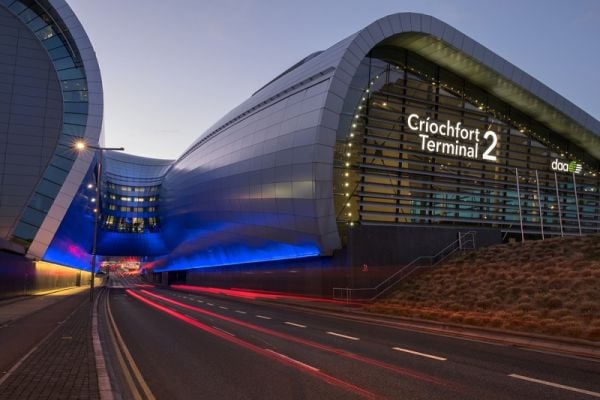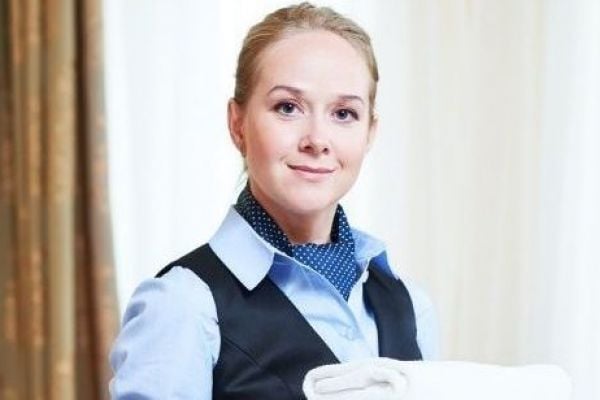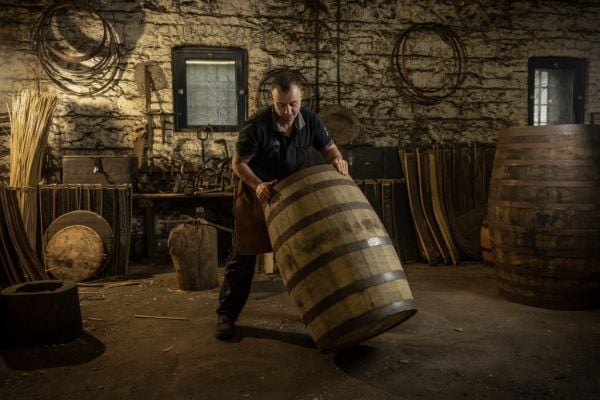For eight years, the National Hospitality Conference has been providing an annual focus on a rapidly-changing industry, making sense of the developments, predicting and projecting into the future, and giving time to some of the most impressive operators within the sector here and abroad. This year – 2013 – was no different.
Phillip Smyth has been director of Shannon College for 24 years. Before that, he was an officer in the Irish army for 17 years. Since taking over as director of Shannon, the number of enrolments has doubled, and the international reach of the college has been greatly extended. Shannon is now a world-renowned Recognised College of the National University of Ireland, boasting a 100 per cent employment record on graduation day.
“Military and hospitality professions have a lot in common,” Phillip began, “for example our ability to reduce tension in international peace-keeping situations, by the deployment of humour and hospitality. In my experience, explosive situations can be greatly reduced by producing a small bottle of Paddy or the suggestion of a cup of tea.”
From there, he moved to the more serious matter of where hospitality currently stands as a profession. “In general, people are impressed with our professionalism, but I am aware that hospitality, in this country, is still not seen as a ‘real’ career – it’s something you do to pay your way through college or on a J1.” hhh
The challenge for the teaching side of the industry, Phillip says, is to focus on their role in educating hotels and professionals as to our abilities, and our capacity for filling labour needs. “There is not a whole lot of knowledge there yet. We wanted to show hospitality as a sector with well-paid management jobs, with more to follow once recovery happens.” The government, he pointed out, is “all about tourism”, yet tourism and hospitality studies are currently under social sciences. The industry employs some 64,000 people, of whom many have learned management skills, including professional knowledge and operational competency; people management skills; communication ability; information technology and financial competency. “Young hoteliers are well paid, with good prospects for advancement.”
And yet, this is a message that still isn’t travelling as far as it should. “The hotel industry needs the best and brightest graduates it can get. Like every profession, it needs an injection of quality new blood every year.” So are the young Irish flocking to this as a career? Sadly, no. Current figures are worryingly low – “we need to get back to the 2007 level,” said Phillip – and we need more managers. The worry is for two reasons – one, it suggests a possible deficit in training, and two, school-leavers still seem unaware of the opportunities available to them within the industry, or are unwilling to avail of these.
Despite tourism being broadly acknowledged as ‘our great national industry’, young people do not aspire to it. Why? “We are a hospitable, friendly nation, but we do not value it as a career,” Phillip pointed out. Parents and career guidance professionals continue to have a negative perception of hospitality as a profession. Anti-social hours and lack of career progression are two problems often mentioned, not helped by negative media coverage of poor workplace practices. During the Celtic Tiger, the trend was to enjoy the hospitality experience rather than provide it. Also, national affluence meant fewer teenagers were taking bar jobs, as would have been the case in tougher times, and therefore entry into the industry at an early stage, was greatly reduced. “Until ten years ago, all postulants to Shannon College would have had hospitality experience,” said Phillip.
“Now, only three-quarters had any type of work experience at all.” Analysis shows a significant decline in this type of work from 2003 to the end of the Celtic Tiger, and a slow increase from then on. In 2005, Shannon College employed a school liason officer, whose role was to propagate two main messages: that hospitality is a multifaceted career with many options, and that Shannon College has a multifaceted ability to train young people for this career. It was, Phillip pointed out, an expensive undertaking, but one that has worked; intake has grown steadily. Shannon also enshrined a mission: to contribute to the national economy. The core values of Shannon College are: intensive practical training; two-year placement in the industry at operative and trainee management level; developmental ethos with a hands-on approach; comprehensive business education.
“Our graduates are our greatest strength; people come from overseas to recruit every year,” said Phillip. “Also, they create a worldwide network, and help with fundraising and further placements.” As such, Shannon has provided a steady stream of managers for the industry – including general managers for the Ritz, the Dorchester, Claridges, Sandy Lane, and the Four Seasons; managing directors for the Hyatt and Marriott, and Gerald Lawless one of the brightest of all graduates, who is chairman of the Jumeirah Group. These graduates are very involved in establishing hospitality as a valid profession. Looking to the future, Phillip spoke about Shannon College being amalgamated with NUI Galway, while retaining its location and unique brand and identity, but having NUI Galway involved in significant ways, including the area of research, and establishing hospitality management in general as a worthwhile profession.
“This is the first time the Irish government has prioritised tourism,” said Phillip; “they understand that it is a stable sector in which to encourage job growth, because jobs can’t be moved to the Far East, for example, or replaced with machinery. Construction and agriculture are both major industries, central to the economy, and this is reflected in the Leaving Cert subjects. I suggest now that tourism studies be included, to reflect the importance of this. There should be a National Hospitality Industry Strategy, that will interact with career guidance officials and teachers. The government emphasis on tourism and the Gathering have created an environment in which negative perceptions can be addressed. And they need to be, because this is one of the fastest-growing industries in the world.”
Next to speak was Nick Lander, genial restaurant consultant and food writer, who established himself as one of Britain’s foremost restaurateurs in the 1980s with L’Escargot restaurant in Soho, London, where he fed everyone from Princess Diana to rock stars and senior politicians. Since 1989 Nick has been the restaurant correspondent for the Financial Times, where his weekly columns, under the byline of ‘The Restaurant Insider’, have looked at themes and trends in the restaurant industry. Nick has also been a food critic on BBC’s MasterChef and is author of the highly-acclaimed book The Art of The Restaurateur. Nick had asked that a local restaurateur join him on stage, in order to provide focus to his comments and findings, something that Derry Clarke of L’Ecrivain most kindly did. “In the age of internet dominance, some things are still impervious,” Nick began, citing hair and beauty as obvious examples, with restaurants in the same category. “You cannot eat a meal online, you cannot sit in a restaurant and absorb the atmosphere, online.”
Nick then proceeded to talk through ten basic points, learned from the world-class restaurateurs he interviewed for The Art of the Restaurateur, including Danny Meyer, Nigel Platts-Martin and Hazel Allen. He began with three key thoughts: “Don’t change to suit yourself, change for the sake of the customer’ (David Nichols, food & beverage manager of the Mandarin Oriental). ‘Don’t think of what your restaurant can do to its local community, but for,’ (Danny Myer), and ‘The thing I most hate about this industry is one phrase – industry norms. I try and break them, and when I do, I feel I’m succeeding,’ (Gerald Diffey, Brooks, Melbourne).
Nick’s first point was, have a sense of humour, to which Derry commented, “In Ireland, you need it, and not just for customers, for your team too. If you are in good form, your customers will be too. It all starts at the top.” The second point, a restaurateur needs three loves – food, wine and fellow human beings. “Too many have only two out of the three; having all three is what distinguishes the best from the rest.” Derry remarked, “it’s difficult to always love my fellow humans. Sallyanne Clarke and Martina Delaney do, they actually mean it. I’m the chef, I stay in the kitchen,” then added, “I like some of them…” Nick then delivered a piece of advice for customers – “never assume the waiter is a mind-reader. If you are in a hurry, or celebrating, or whatever, tell the waiter. That way, they know and can help.”
Point three – pick your location, but this doesn’t necessarily mean going for the top spot. Nick cited the example of Moro restaurant, which opened in a spot originally billed as “post-nuclear”, and is now one of the liveliest, safest streets in London. “Chefs and restaurateurs can open up areas of the city,” Nick explained. “And having an inexpensive rent can be a huge advantage, it can compensate for the other terrible mistakes you’ll make. Also, restaurants are in a stronger position to negotiate with landlords, who are beginning to realise the social impact of a good restaurant.” To which Derry added, “we opened L’Ecrivain in 1989, in a basement, with 28 seats. We made loads of mistakes, it was a small, small restaurant, but we thrived.” He also made the point that rates in Ireland are very high in comparison with London.
Four – “Understand financial arithmetic, learn to read a P&L account, always pay your small, independent suppliers.” Derry Clarke agreed: “Yes, especially in the last five years, the emphasis is on cash-flow, cash-flow, cash-flow. People who go into this as a hobby, close within a year. I look at each year as an entirety, not just a month in advance. An unexpectedly quiet night can take a week to get back.”
Point five – a good one – “lead from the front. Inspire, lead, communicate. Be there, even if you’re not that competent. You could be the worst waiter in the world, and the staff will still get a boost from seeing you on the floor.” The restaurateur’s role, said Nick, is to “loiter with intent. Watch, see what your customers are doing, how they are using the space.” Derry concurred, “if you’re there, you see so much more than anyone can ever tell you. And you don’t have to play the whole ‘mine host’ thing unless you want to.”
Point six – discern what really is of value. “The two most important pieces of paper are your lease, and your alcohol license. Alcohol drives profitability, and your lease shows the value of the business if you ever run into trouble.” The ideal lease, he said, is a short break-out, with the option to renew or buy.
Seven – determination is key. “Combine vision and determination, because one without the other is not enough.” To which Derry added: “Hard work and confidence. Everyone has a vision, confidence is 90% of succeeding, and the older you get, the harder it is. Eight – rigor and flexibility. “Combine stubbornness with the ability to bend to popular demand. Hold on to what inspired you in the first place, but be prepared to bend. And learn the importance of women as customers.”
Nine – a thick skin. “Resilience is a very important asset.” Derry agreed, “We have had many, many reviews at L’Ecrivain. We’ve had excellent, mediocre, good, bad. I learned more from the bad reviews than the good ones. You have to take it on the chin, acknowledge that it may have been a bad night, and learn what you can.” Point number ten – Nick spelled out three of the biggest commitments of any restaurant: the environment, the importance of local community, and the power every restaurant has to do good, meaning hosting charity events, donating to support local causes and so on, all of which mean a restaurant is firmly embedded in its local scene.
This year’s Conference featured a lively and informative discussion between a panel of successful Irish restaurant operators from all across the industry. The panel included Derry Clarke, Le Plancha’s Andrew Lawlor, Tim Magee of Host & Company as well as Wineport Lodge owner, Ray Byrne. Clarke provided one of the most talked about topics of conversation on the day by making the prediction that there will be a crash in the lower-end of the restaurant market within the next year, because “there is too much value” in Dublin at the moment.
Clarke was making reference to the increasing number of restaurants which are offering two and three course meals for less than €15. “The number of restaurants offering meal deals at economically non-viable prices just isn’t sustainable, it’s the same cost in McDonalds, but we have all of the overheads,” he said. “There is going to be a crash, in Dublin in particular, in the next year.”
During the discussion, the industry experts also directed harsh criticism toward the Michelin Guide, after the recent “uninspiring” announcement of their star recipients. “To the average diner, Michelin is about as relevant as a trouser press,” said PR specialist Tim Magee. The panel were especially critical of the number of Irish restaurants that weren’t recognised by the Michelin Guide 2013, particularly the ommission of The Greenhouse on Dawson St.
“According to the guide, Noma and Mugaritz, which both have two stars, are just worth a detour. Not worth a special journey. That is their take on the world’s most influential restaurant and one of world’s best yet they list a half dozen soulless near identical 3 stars in Lyon and Paris that they claim are worth the special journey to, but most have the atmosphere of a dentist or a Dubai Duty Free,” said Magee. The Budget, having only been delivered by Minister For Finance Michael Noonan the previous week, was warmly welcomed by those taking part in the panel discussion.
“The budget was exceptionally good,” remarked Ray Byrne. “My wife thought it [pre-budget rumour of a 12 per cent hospitality tax] was never changing, she thought it was just a marketing ploy.” “Restaurateurs did well out of it. However, a lot of stealth taxes will hit customers, which means they may have less to spend in our restaurants,” said Byrne. “The big challenge is to get their mojo back. To remain creative, to refurbish when it is needed,” he said.
The positives of Ireland’s summer weather were talked about at great length all over the country, but Le Plancha’s Andrew Lawlor pointed out a unique worry for restaurant owners. “The good summer affected us negatively actually. Everyone seemed to have BBQs out their back gardens, and that hit us,” said Lawlor. But he encouraged those in the industry to “keep pushing” innovation in response to difficulties. “It’s a big challenge, but success is staying open. Trying to improve, keeping customers coming back. We just need to keep coming up with new ways to keep customers in seats”.
Next to speak was Tim Healy, who has worked for over 30 years in marketing sevices and is managing director of Mercator. Tim has managed projects across a wide range of businesses in Ireland and abroad. He regularly works with Bord Bia and is currently chairman of the Association of Irish Marketing Research Organisations. “Our role, as market researchers, is to help our clients understand more about their customers, both mainstream and specialist,” Tim began. “We are looking towards business growth, and the different ways to plan growth in the coming months and years. The questions are – do you want customers to come more often? To spend more when they get there? To come to you for the first time?” He cited as an example of such a strategy, the Gathering. “Visitors to Ireland were persuaded to come more often, to spend more, perhaps to come for the first time. A measure of the Gathering success is that it opened up all three possibilities.”
The challenge for hospitality operators, Tim said, is “How can we create more Christmases? Bring more excitement into the timetable?” But the first thing to do, is ask, “How do you look at your customers? Do you know them?” Tourism Ireland, Tim explained, track 11 different attitudes and perceptions in working out if there are things they need to do more on. These are broken into three categories: firstly, ‘familiar advantages’ (meaning scenery, local history, friendliness and culture). Then come ‘outside and uncontrollable advantages’, such as ease to get here, good all-round value for money, safe and secure destination. Last are ‘controllable advantages’, including ‘a good place to get involved and feel part of,’ a unique holiday experience and a family-friendly destination.
For a memorable experience, you need to add magic, explained Tim. “Every brand should add magic. Market research will establish what customers want, after that the question is, how can you improve? Market research is also an ability to build a relationship with your customers – whereas things like Survey Monkey, or comment cards, don’t do a whole job, just one side of it. They ask for opinions, they don’t give anything back. By actually speaking to your customers, you will find out gems that you will never get from a comment card.” The composition of the questions you ask is very important – by adopting the standard patter: ‘were you satisfied with your room/meal/etc?’ you are likely to get only the very good or the very bad. But what is happening in the middle ground? ‘Was there anything we could have done better?’ is a more open-ended question, asking people to think more about what they have had in terms of experience.
And of course, Tim emphasised, remember to ask staff, who may know far more than you expect. ‘Are the customers happy? How are we doing?’ Some owners feel reluctant to put the shoe on the other foot, as it were, but it is important to conquer this. Staff are the front line, they know, notice and recognise far more than many owners give them credit for. Next up was Jonathan Doughty, founder and group managing director of Coverpoint Foodservice Consultants, an international management consultancy working in over 50 countries. Previously a chef and restaurateur, Jonathan has held various management roles with Trusthouse Forte, Marriott and Mars.
Coverpoint have completed projects in the Far East, Africa, South America, mainland Europe and the Nordics. Jonathan is also the past UK & Ireland chairman of the Foodservice Consultants Society (FCSI), the Chairman of FCSI EAME and on the FCSI Worldwide Board, as well as an active member of the BCSC UK Executive. He also sits on the judging panel for the Cateys. “As businesses, your ability to stand out from the competition is getting better,” he began, “but the cost of goods isn’t, the people you employ aren’t, and the quantity of competition isn’t.”
The austerity movement has meant customers are rethinking spending. They still go out, but they spend less. However, simply discounting is not enough, because it promotes promiscuity, people “run around looking for better value.” Instead, the trick is to discount, but offer an experience also, or an ‘added value’ differentiator, such as something complementary in the room. “Experience will be king,” said Jonathan. “Nobody goes to TGI Friday for the food, they go for the experience. Great food alone is no longer enough, you need to wrap the food around experiences, and the experience around food.” Working with skill shortages is also something hospitality businesses need to understand. “Job vacancies will continue to increase. You need to de-skill, re-skill and cross-skill.
Train and hold on to your own staff,” said Jonathan. The demand for convenience is growing as people work longer hours. Mobile devices are always on, there is more work and more access to work, meaning we now have two currencies – time, and money. If we have money, we can buy time. Trading hours have to adjust, consequentially, to serve when the customer wants serving.
An ageing population will affect the eating out market. Younger people may eat out with greater frequency, but older people are more flexible with time. So target your audience, give them 50% less at a time when your restaurant is traditionally empty. Also, people are starting to eat smaller amounts, more often – casual grazing is the new way, rather than the old style of three large courses. Increased knowledge is another factor; everyone now thinks they are a foodie. But, restaurants can cater to this expectation of knowledge too – for example, let customers order wine on an iPad, and show them which part of France the grape comes from, and watch a video of the guy who runs the winery.
iPad testing for room service is well underway, and suggests it may increase uptake by 38 per cent, because people can actually see what they are ordering. Plus, the interactivity allows you to suggest ‘that dish will be really nice with a glass of Sauvignon blanc’. Ethical initiatives are also important, with business’ credentials coming under scrutiny from consumers. Even McDonald’s are subject to this kind of appraisal, Jonathan said, and acknowledge this fact by paying great attention to their provenance and supply chain. However, he pointed out, beware trying to fake it. Consumers are very clued in, and over-claiming can only lead to exposure and trouble. Part and parcel of the ethical interests are environmental concerns; customers increasingly worry about sustainability and waste reduction, meaning they like to see initiatives such as ‘grow your own’ and ‘grey water,’ as well as efforts made by hospitality businesses to recycle and regenerate their own waste.
People travel more and further, meaning your customers are no longer just the local area, the market is multi-lingual, and you need to communicate effectively. “We need their money, why should they have to work to understand us?” said Jonathan, citing the Tower of London, which operates eight different languages.In a world with increasing digitalisation, people now meet, chat and shop online, but still cannot eat online, which means that food becomes a USP. However, they do increasingly expect to use their phone and devices everywhere they go, with free WiFi as a given. They also expect hospitality businesses to have a mobile site, and for this to function as well as a well-designed website. In Scandinavia, 75 per cent of transactions are now by card, with other countries trending the same way. This also means faster transactions with high turnaround, which is the holy grail of fast-food outlets. Pret-a-Manger, for example, now only serves one-size coffee, something that has shaved eleven seconds off each transaction.
We now live in a ‘sharing’ society, in which personality and identity are very important. You need to create a personality for your business, and engage with customers in a manner that is not just about food. Also, simply delivering large portions will not create the experience you require. In the US, average portion sizes are up 215%, but here there is a distinct trend towards sharing plates, and simplicity of choice.
There is also a trend towards healthier choices – low-calorie and locally sourced – that is matching with a trend towards fast food. This is the strongest emerging business type, but quality is a key part of it. Burrito bars and Nandos both tap into this. This is fast food, but done well, with low price and high experience as the defining factor. Customers do half the work – ordering, often collecting, at the counter – which reduces cost-per-minute. This kind of fast-casual is the most productive sector of the industry at the moment.
“Understanding Generation C is key to success within the industry,” explained Jonathan. “And this is not an age-group, but a lifestyle, based around creativity and content. Gen C demand constant product innovation, these are people who want to get involved, as a group, and participate, and who won’t change their habits as they get older. They are fuelling the growing demand for authenticity – customers now want transparency in food, an increase in communication around provenance, they favour artisan rather than chain production, and actively seek out what sets one business apart from another.”
Lastly we enjoyed the publican panel, which included Kristian Burness of The Waterloo; Deirdre Devitt of The Two Sisters; Seaneen Sullivan of L. Mulligan Grocer; Darren Moore of The Church and nightclub expert, Anthony Friel. Starting off by looking at the Budget, which had been released in the days leading up to the conference, Deirde said: “It’s the same old story. Hit the excise - widen the gap between the on- and the off-trade.” Seaneen agreed. “It was expected,” she said of the hike. “What really annoyed me was nothing was done about below-cost selling. Multiples selling crap beer for very little.”
Anthony Friel spoke of the night-time trade and its current difficulties, a topic he writes in detail about later in this issue. When asked about the potentially smoke-free society which the Government set its sights on on, he said “the Government has bigger worries, like the night-time economy. “House parties and below-cost selling, everyone here is affected by this. We have not approached it in the dynamic way that we need to. We have been too reactive.” Darren Moore was quite honest in his approach to attracting custom into the Church on Henry Street in Ireland’s capital city. “The Irish pub is what customers want it to be,” he said. “If they want food or music, you have to come up with a way to satisfy that. Over the past few years, we have had to look at how we satisfy our customers and differentiate our offering.” Finally Kristian spoke of the lunch-time trade, and how difficult it is to compete nowadays. “At lunchtime, everyone is competing at the same price. Spars and Centras, for example. You can get a meal in a pub for the same price as a roll, crisps and a drink.
"But we have all the overheads.” As a final point, this was something everybody seemed to agree on.









